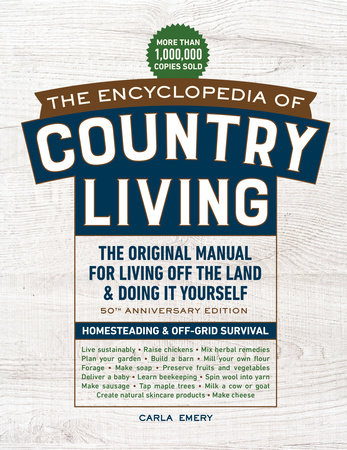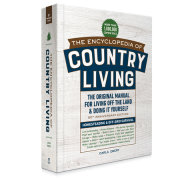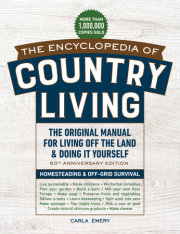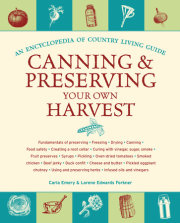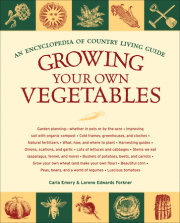What This Book Is
This book has been written—and rewritten—over a span of 32 years. Like a geological deposit, it has layers. The first layer was the ambitious 12-page table of contents I started compiling back in 1969. That’s when I first got to thinking about this book. I wanted to put into one work everything someone would want or need to know about family food production. I wanted it to be a complete reference, an encyclopedia of information and skills, a practical resource anyone could use.
The “back to the land” movement had started happening then—a tremendous out-migration from cities to country. I was living in a tiny town in northern Idaho, and the newcomers were everywhere, full of urgent questions about growing plants and raising animals. So the next layer of the book got written as I tried to answer their questions, encourage them in the hard moments, and help them adapt to the harsh realities of country living. I was struggling to create for them an affordable, single-volume reference work on raising and preparing food—every kind of food, every step of the way—from planting a seed in the garden or mating animals to preparing a meal.
I was also trying to preserve the precious knowledge of an older generation of homesteaders—knowledge that was rapidly disappearing as that generation passed on. It seemed that traditional, “old-time” technologies were being cast aside as people flocked to petroleum-based technologies and centralized supply systems. I wanted to help record and preserve the traditional methods. They offer a workable alternative to petroleum-dependent technologies, and as we continue to deplete the earth’s oil deposits, the old, self-sufficient methods will become more and more important to know
Mrs. Harless and Imogene Kepford were among the first old-timers I talked to. I visited their homes—where they always made me feel welcome—and listened to them, enjoying their blunt, charming, pioneer language. Their amazing knowledge about every aspect of home food production humbled me. I began trying out what they told me—and writing it down. Then I’d return to their homes to ask more questions, and I’d write those answers down too. When Mrs. Harless died unexpectedly about a year after I met her, I felt as though I’d lost a mother. And I realized how much harder and faster I needed to work on my project.
Today, a general ignorance about food production— as well as the lack of land on which to grow plants or raise animals—makes most people captive consumers. Unlike their great-grandparents, the urbanized members of today’s society are almost totally dependent on other people to produce their food, clothing, and shelter—and they’re subject to the market prices for those essential commodities. Many people spend their lives a paycheck away from hunger or homelessness—because they must pay other people to supply their most basic needs.
I love education and books because they empower people. That’s what this book is all about: providing you with the information you need to do things on your own, instead of paying someone else to do them for you.
Another layer of this book comes from the many people who have contributed to it. I’ve been helped by an army of persons who have shared recipes, advice, and information gained from years of experience. And every time I finished another edition of this book, people wrote to me with corrections, or with more information, or with important questions I hadn’t answered. The book grew and improved edition after edition, prodded by those interactions with readers. So this isn’t only “Carla’s Book.” Often I just had the humble task of stitching together information from other people, guided by the knowledge and experience I do have.
It took me four years to complete the first edition of this book. During that time, I was a lonely rural housewife, grateful for my pen pals from all over the country—wonderful people who read early parts of the book and shared with me recipes, advice, and encouragement. As I continued writing the book, I kept thinking about those faraway but precious friends, and I began including personal thoughts and memories in my book, sharing with my readers stories about myself, my past, my life. Thus, another layer emerged.
I added several more layers. I described mushroom cultivation and aquaculture, and updated the book to give advice on problems such as killer bees, global warming, and pesticide contamination in food. Because the international swapping of seeds has made a multitude of non-native, exotic plants available, I added extensive instructions for growing and cooking those plants. This information is useful to city folks as well, now that so many “new” fruits, vegetables, and herbs are appearing in supermarkets. I also added websites and e-mail addresses for over 1,500 mailorder sources. In fact, as this book has evolved, I’ve thought of more and more ways it could be useful to city- as well as country- dwelling people. I’ve begun to think of it as—and have strived to build it into—a basic kitchen reference work, so packed with reliable, practical information that any family, urban or rural, would want to own it. Is that the final layer? If the last 32 years are any indication, probably not!
Copyright © 2019 by Carla Emery. All rights reserved. No part of this excerpt may be reproduced or reprinted without permission in writing from the publisher.

